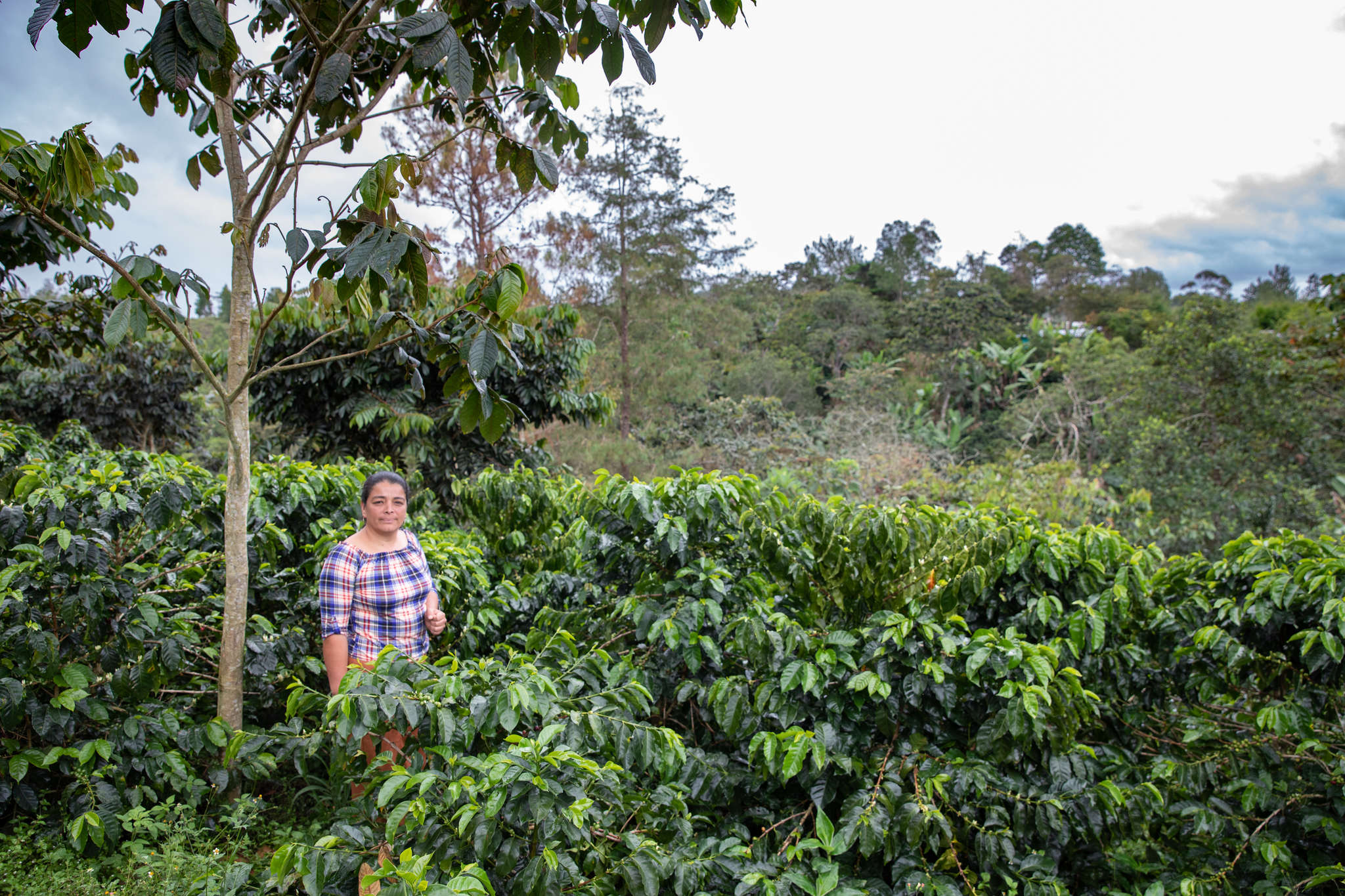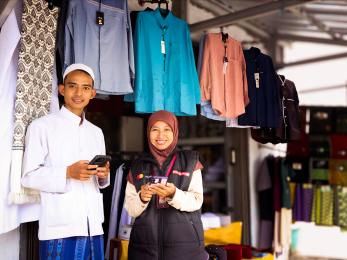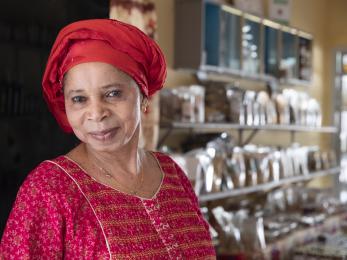A future without migration: How we’re empowering youth to build a life at home

As the morning sun slowly warms the hillsides, 16-year-old Olga gently gathers stakes and old vine supports from a dusty plot in the Guatemalan highlands. The harvest is over, and rows of dry, papery stalks are all that remain of the lush snap pea plants that once grew here.
She talks and giggles with the small group of other youth cleaning the land beside her. Once the field has been cleared, it will be ready for them to plant again when the first rains come in spring.
This demonstration plot, a hillside rectangle of soil encircled by tall, brown grass and avocado trees, is where Mercy Corps is teaching Olga and other young people from the nearby town of Panimatzalám how to grow healthier, more bountiful crops.
At mid-morning, the group breaks to rest and refuel with a mug of hot corn atole, a thick cornmeal drink. Despite the hard work, the mood is still light — these youth having worked this land together for almost a year.
Still, the idyllic setting conceals a difficult reality: poverty here is virtually inescapable.
So the youth are leaving.
With limited options, youth flee for a future

Almost every family in this area makes their living working in agriculture, but for most of them, it’s not nearly enough. Families struggle to meet their basic needs, let alone send their children to school. And income opportunities outside of agriculture are almost nonexistent, especially for young people who can’t afford an education.
“One of the hardest things in this community is the economic part,” Olga says. “Job opportunities here are few, so many young people migrate. It is very difficult to find a good job here.”
In fact, Panimatzalám has one of the highest rates of migration in Guatemala. People who don’t see any other option to earn money flee to Guatemala City or the United States, desperate for a better way to provide for their families.
And the evidence is everywhere. Every other home in Panimatzalám is a large, pristine adobe manor, an immediate giveaway — in a village of otherwise modest homes — that at least one family member is in the U.S. sending money back.
“The truth here in my community is that many families are impacted …,” Olga says. “Each time [someone leaves] our community is deteriorating.”
Olga, too, has felt the pressure to migrate.

Small and stoic, with a round face and a focused gaze, she is seated on a simple bed, one of the only pieces of furniture in the humble residence she shares with her parents and younger brother. The dim hut’s only window casts a small pool of light across the dirt floor in front of her.
“Before … I was thinking about migrating to the capital,” she explains. “I thought that I would have to work to help my parents and my little brother.”
Olga didn’t make it past primary school before dropping out to help support her family. She was sad to leave her education, but she didn’t have a choice. There simply wasn’t enough money.
So, she traded her studies for a life of labor: helping her parents raise chickens and tend the local fields, working as a tailor in a neighboring village and weaving traditional huipiles in her spare time for extra income.
The thought always lingered that she might have to leave to provide for her family.
“I didn’t care if I had to make a sacrifice to see my brother go to school,” she says plainly.
Until getting involved in Mercy Corps’ youth program, she had resigned herself to a life of subsistence agriculture or informal labor in the city. Like so many young people in her community, Olga didn’t have the confidence, or the prospects, to envision anything else.
Mercy Corps provides youth like Olga with agricultural training, financial knowledge and life skills, so they have the resources they need to thrive without having to leave their home. And it’s working.
“When this program started it taught me a lot of things, and now I am more than willing to stay here in my community,” Olga says. “Now I have the hope that I can do what I want, and I can have a different future if I make an effort.”
New resources, new vision

Olga participates in all the Mercy Corps program activities, which provide the youth with resources and education they’ve never had access to before: the demonstration plot, where they’re taught better farming practices; the savings and loan group, in which they learn how to save and invest; the workshops that boost their life skills and teach them about different possible vocations.
The different activities all ladder up to one lesson for the youth: It’s possible to build a stable life in Panimatzalám with agriculture, but it’s possible to pursue other things, too.
“This program is implementing new ideas for young people, and [now] when young people think of migrating they think twice about it,” Olga explains.
For youth like her, simply having an opportunity to dream is new. Being able to make it a reality is transformative.
“I now value myself more. I am not fearful about public speaking, and I feel more confident talking with others,” she says.
There are no traces left of the shy, hopeless girl she says she once was. With a resolute tone and an unstoppable grin, she now speaks assuredly about her future.
She is a girl with plans.
Olga has already shared what she’s learned about agriculture with her parents, so they can increase their productivity and income. With her knowledge in saving, she’s putting money away to eventually go back to school.
And with her new sense of empowerment, she’s determined to stay in her community, finish her studies and become a fashion designer.
A future without migration

Thirty minutes away in the nearby tourist town of Panajachel, Olga takes a seat at her tailoring station in a light-filled warehouse lined by large, dusty windows. Her shift is about to start.
Surrounded by fabric scraps and spools of bright thread, Olga places a piece of blue fabric in the machine and methodically presses the foot pedal.
She knows it will be difficult to go back to school, support herself and continue to contribute to her family, but it’s a challenge she’s ready to take on.
“Since the program began my life has changed,” Olga says. “I did not trust myself very much before. I would say to myself, ‘Oh, well, I cannot do that.’
“But in this program, they taught us different topics, so I started to become stronger. … And now I believe more in myself, and I know that if I want something for myself, I can achieve it.”


